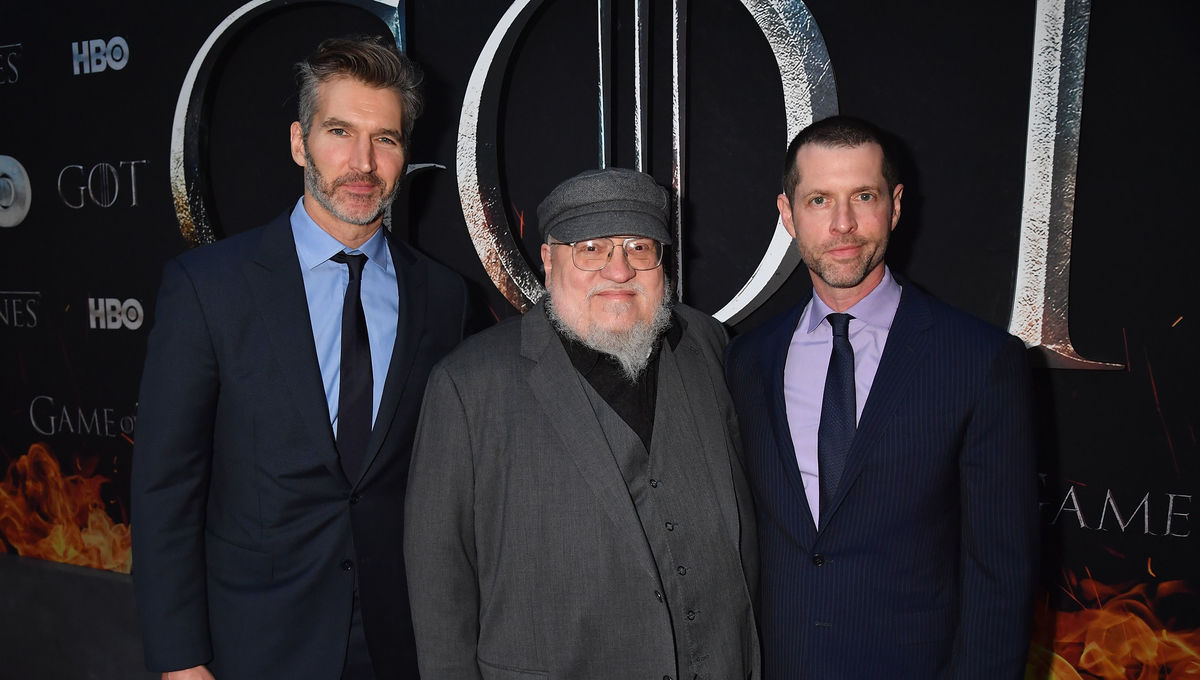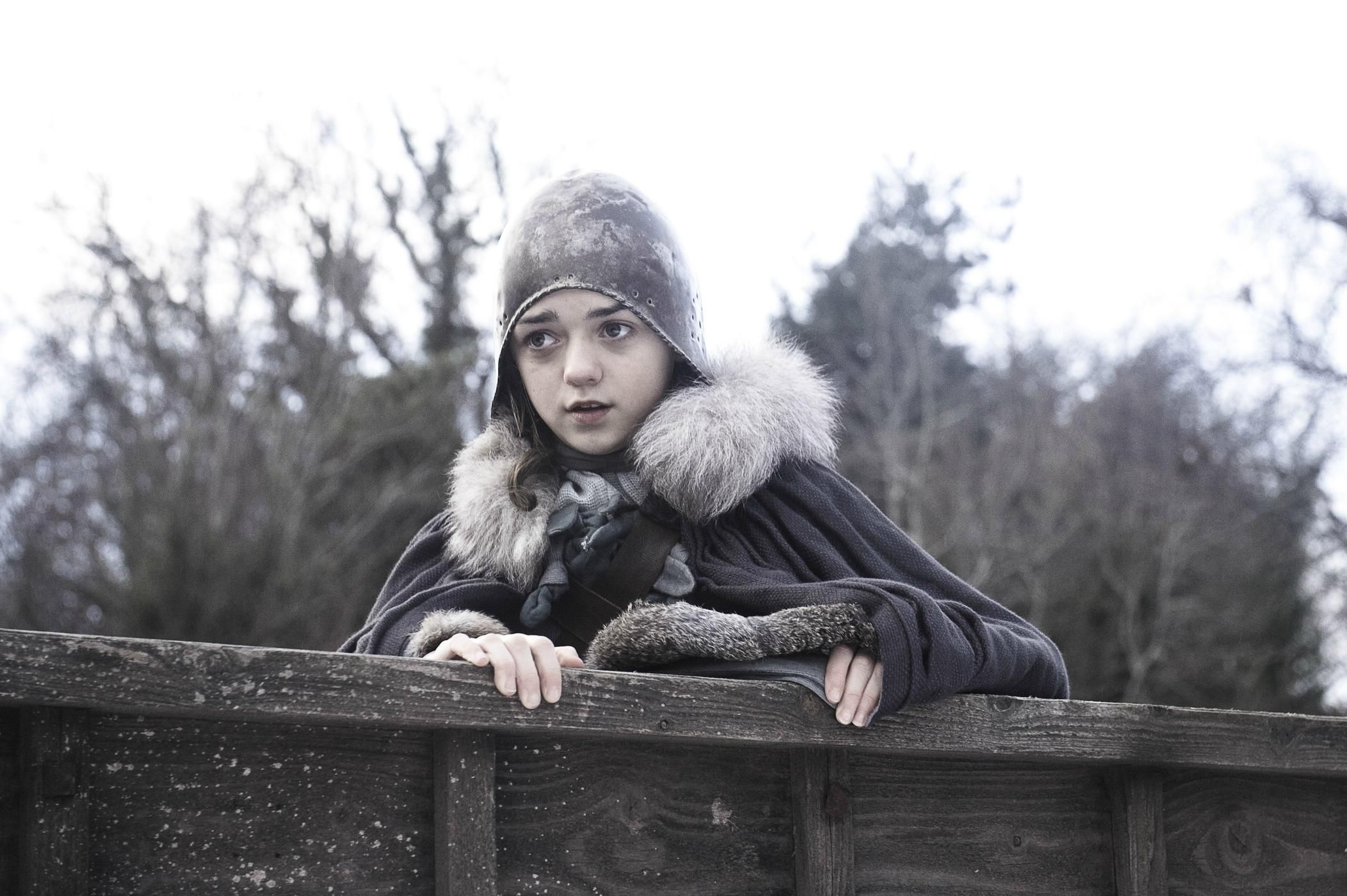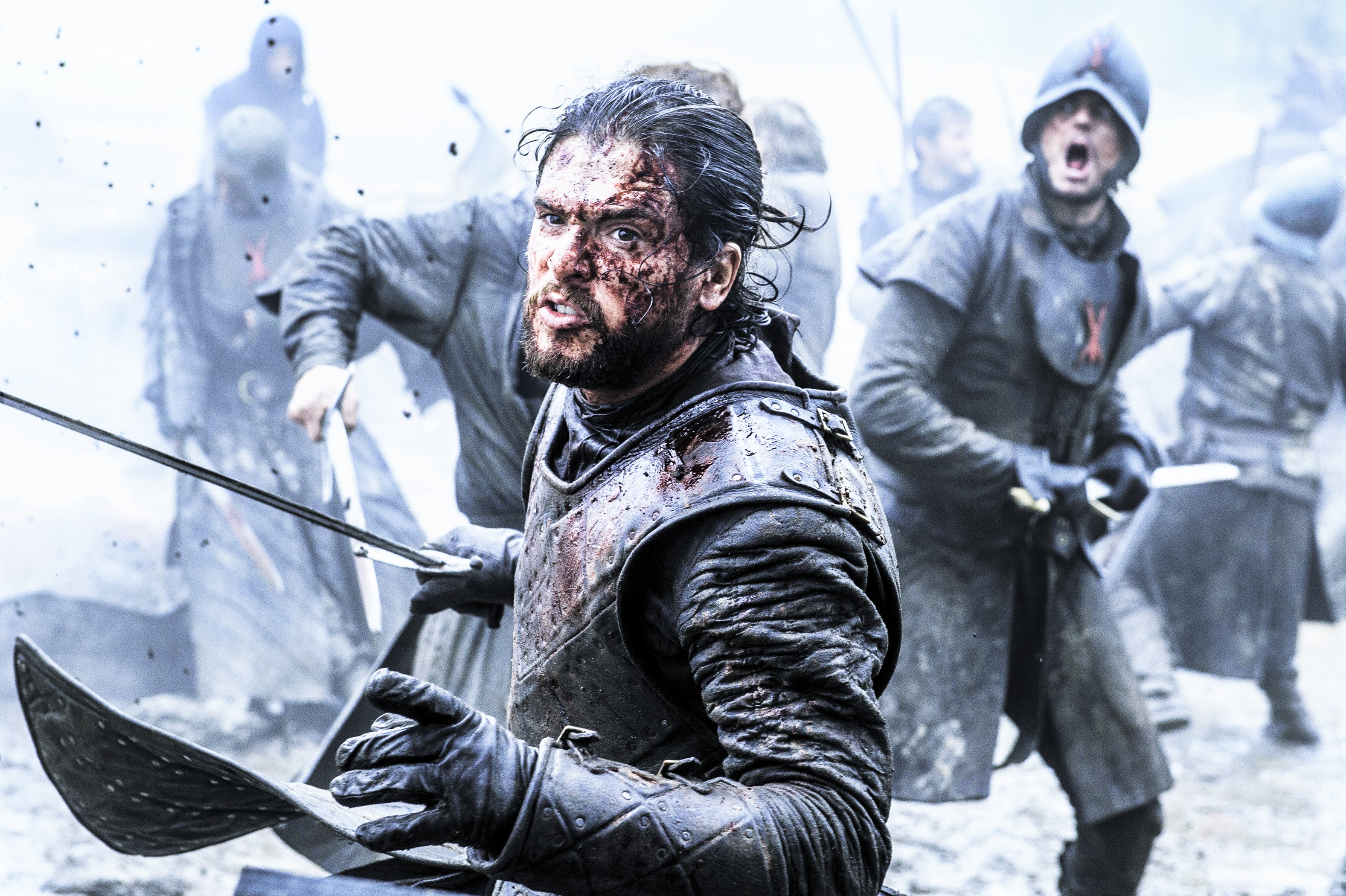
David Benioff, George R. R. Martin and D.B Weiss at Season 8 NYC Premiere.
Photo by Jeff Kravitz/FilmMagic for HBO.
It’s been a crazy couple of days for Game of Thrones news, hasn’t it? The showrunners jump from Star Wars to Netflix; the prequel pilot is cancelled; and a prequel concept with no pilot is given a full season order instead! During all of this hullabaloo, there was also a controversial talk with showrunners David Benioff and Dan Weiss at Austin Film Festival, where they discussed their decade-long learning experience as producers and writers on the show. Why should that cause any controversy? Well, let’s find out!
The polemic wasn’t so much due to what Benioff and Weiss said, but more due to what as of a few days ago was the only existing account of the talk: a live-tweeted thread by someone with a rather obvious axe to grind. Personally, even before being able to listen to the original audio, I could tell some of the statements sounded strange coming from Beniof and Weiss; after a thousand interviews, they repeat themselves a lot. Once I got ahold of the audio, it turned out my suspicions were… not wrong.
Basically, that Twitter thread showed them in the most terrible light possible, often by quote-mining the writing pair or mischaracterizing their jokes as genuine statements; and a few damning times even outright misquoting them. The audio that’s surfaced since isn’t of a great quality, but I’d argue it’s preferable to an erroneous account:
At the start, Benioff and Weiss are asked to explain how they broke the first season as writers and how they approached adapting George R.R. Martin’s books:
“When we were outlining season one, and at that point it was just the two of us and Bryan Cogman, we’d start putting scenes out in index cards on the board, as you do; with different colors for each plotline,” Benioff explained, and Weiss took over: “At one point we had 112 different colors on the board. I remember looking at it and wondering ‘Is this actually going to make sense to anybody? Is this going to be something people can follow?’ When we started, we knew what we were up against; George wrote these books to be unproducible. There’s a long story about why, which we discussed in the last panel we did, but the point is he didn’t write it with television producibility in mind, so we knew we were facing questions about the carrying capacity of the television show; how much can you have happening without losing people.”
“Later, when George’s books continued to grow, there were places where we just had to compress and condense to make it producible for television,” Weiss continues, “just because if we’d included all the characters that were in the books we’d be running up against a situation in which people would be dropping the balls of the Tyrions and the Danys and the Aryas; the characters they care about. At that point we stopped putting pieces on the board for the most part.”
In terms of the show’s faithfulness to the source material, Benioff argues “the first season was actually quite faithful to the first book. The second season maybe 10% less. Every season’s gotten a little bit less faithful, just because the scope of George’s story kept getting so much bigger and bigger.”
“I think Steve Martin said something to the effect of ‘Every adaptation process is like a marriage that ends in divorce.’ Sometimes they’re amicable divorces. Sometimes they’re ugly divorces. You always start with the best intentions, to be faithful forever, and then you start to have some other ideas, you start to stray a little bit. In a way, given the scope of what George created, I think we had with what ended up being a very amicable divorce from the source material; because we ran out of it,” he says jokingly. Weiss, in turn, then adds: “Even before that, the carrying capacity of a television show is not the same as that of a book.”
Regarding the original pilot, which famously had to undergo heavy re-shoots, Dan explained that “as a television show, it was the kind of show that was a film/TV hybrid, in a lot of ways [acting as a film] in terms of the production design, the shooting schedule, all of that stuff; but it needed to be done in a TV budget and timeframe. So everyone involved was figuring out how to make something like this for the first time, and it just took one more than one try. We were given a second chance, though they were probably about 50/50 on whether or not to give us that chance.” Though it was a new process for everyone, Benioff doesn’t want to pass the buck: “We were the showrunners, so if the show’s not working, we screwed it up.”
Though they were experienced writers before the show, David and Dan had to learn to communicate their ideas as first-time producers, as Weiss describes it: “We knew about story, we knew about character, and we knew tone, and how we wanted it all to feel, but all the rest of it we had to learn; and translate what we felt into words that would, say, lead a production designer in the direction that would produce the result we wanted.”
An age-old anecdote about the show is that the first season came up short and they had to write additional scenes, but I’m not sure it’s ever been said why that happened in the first place. It turns out the original scripts were timed correctly to fill what HBO required, and they only came up short because the production started running out of money for certain expensive scenes, such as the Battle of the Green Fork with Tyrion and the Mountain. Since they had to cut that and similarly expensive sequences, they had to resort to creating the famous one-on-one conversation scenes they added later, such as the private chat between Robert and Cersei:
“They tended to be two- or three-handers; people in rooms talking, scenes they could just shoot in a morning,” Benioff said. “It was terrifying at first, but then it became fun. Because of their nature, these scenes weren’t plot points; the plot-driven scenes were already in there. So these were scenes that had to be interesting enough to justify their existence but didn’t really move the plot forward,” Benioff said. “These scenes weren’t in the book. This was the first time we deviated at all from the central narrative. By that point, we’d gotten to know the characters a lot better, we’d gotten to work with the actors for months, so their voices were in our heads when writing.”
At this point in the talk, we arrive at a point whose reaction stumped me the most. The writers have often described how the actors’ performance has shaped their characters, which I see as a laudable artistic collaboration between writer and performer:
“As you get to know Maisie, as you get to know Sophie, and everybody, they find their way into the character,” Weiss illustrated. “It’s like they redecorate the house you gave them, and, after a couple of seasons, in some cases it doesn’t even resemble the house that they moved into. They’ve done their work on it. You’re following their lead as much as they’re following your lead. They’re creating the psychological nuances of their character as much as you are on the page.”
Unfortunately, some people apparently see this perspective as sacrilege; as if they were leaving sacred source material to chance. But that’s not the case. Actors aren’t just marionettes hired to perform a reader’s or writer’s imagined version of a character; part of their role is shaping the character, even if it results in deviation from the source material. I can’t help but see this as a positive element of cinema and television, which is made in collaboration between sometimes hundreds of artists, instead of a single writer.
Additionally, you may have heard that David & Dan wanted to “remove” as many fantasy elements as possible because that wasn’t “the type of fan” they wanted to appeal to. It’s also been reported that Weiss (rather misogynistically and paternalistically, if I say so myself) stated that they wanted to appeal to “mothers,” as if mothers were unable to enjoy fantasy. Thankfully, that’s very much not what they said:
“With the fantasy genre on television, tonally it’s very easy [go too] campy. Every scene, you change these two lines and it’s Monty Python and the Holy Grail,” Weiss jokes. “Also, in terms of fantasy exposition, with proper nouns, it’s almost like a game of Jenga, where you’re trying to plow as many of them as possible without the whole thing falling over. In the first pilot, we had one too many and the whole thing fell over. Going forward, we tried to keep that stuff to a minimum, because we didn’t just want to appeal to a fantasy fanbase. We wanted them to love it, and we wanted our parents to love it, and people who play professional football to love it. We wanted to reach a wider audience, and to do that keeping the tone [under control] was very important.”
Weiss later adds that when they first pitched it to HBO, they just didn’t tell them about all the fantasy elements, though David and Dan obviously were very much aware of them and in favor of including them: “We told them ‘This isn’t about a million creatures fighting a million other creatures. This is about people.’ We knew, having read the four books that existed at that point and also just being able to extrapolate the future of the story, that it was gonna turn into exactly what we promised HBO it wasn’t.”
In a similar vein, discussing Craster’s baby boy brought by the White Walker north and put on an altar of ice, in that famous season four scene that one could argue was the first to pass the books, the showrunners say they’ve never been more stressed; not because of the Night King, but because the baby was real. You might’ve read that Dan said that “the mother was not happy because Dan just kept talking about a close-up of the baby’s penis,” which is quite strange, or perhaps even concerning. What Dan actually said was a funny, self-aware anecdote about the fact that they had to establish that the baby was a male, since only Craster’s boys were taken by the White Walkers, so he loudly said so on set, which understandably made the mother uncomfortable.
“The two of us and [Director] Miguel [Sapochnik] talked a lot, exhaustively and exhaustingly, about the importance of shooting the battle from a point of view,” Weiss said about planning the famous Battle of the Bastards. “We wanted everything to be from someone’s potential point of view, if possible, because that’s what prevents a special effects-driven battle from having that certain video game quality. That happens because the camera can do anything; there’s no real camera a lot of the time, so when you can do anything, you do anything. You’re sweeping around with this God’s-eye point of view of a camera that doesn’t exist in a set that doesn’t exist, and it starts feeling fake. We wanted to pin it to a character and make it feel like this isn’t the experience of this battle; this is the experience of Jon Snow’s experience of this battle.”
As for the value of considering other people’s feedback, Benioff didn’t egotistically dismiss it outright, as you might have read, but instead said that they “realized at a certain point that it would drive us crazy” to check everyone’s opinions online, and that it wouldn’t have the intended effect. That’s not to say they believe themselves to be infallible: “Good things are done by groups of people: [the show wasn’t done by] two people or four people, but probably two hundred people, [all of them] essential, working together. But I don’t know about the value of a committee of ten million people.”
Finally, neither of them said they “didn’t try to understand the books major elements,” or even dismiss themes per se, as Benioff has been quoted as saying (out of context.)
“There’s this famous Russian poet who read his poem and someone in the audience said, ‘You mind explaining the poem?’, and so he re-read the poem, and that was his response. That’s it,” Benioff said. “[A Song of Ice and Fire] is such a complex story that I don’t think we ever tried to [boil it down.] You kind of have to have a prepared answer –‘It’s about power, and family,’ and that’s all true; it is about power, it is about family. But I think it’s also true that two shows can have the same themes and be wildly different, and one’s good and one’s bad, and honestly it’s about the complexities they try to depict, it’s the characters. To try to cram it into a single aphorism isn’t helpful for me. There are other writers I know and respect who feel very differently, and operate differently, but for both of us, it’s not the way we work.”
As I have said elsewhere, David Benioff and Dan Weiss are not favorite people of mine. I don’t think I’d like to be their friends; and it is undoubtedly frustrating to see them admit their initial inexperience (however self-aware and self-deprecating they may be) while having way more opportunities than anyone who isn’t rich, cis, het, white, and/or a man (I, for one, certainly hope “House of the Dragon” has a proper writers room with a wider and more diverse set of voices.) All of that is true (though, perhaps more relevantly to this discussion, it’s always been true; even before the ending to their series was widely disliked.)
Nevertheless, the tone of that original account on Twitter, in which David and Dan were made to look like they were speaking about their ignorance and inexperience with a frustrating happy-go-lucky lack of self-awareness, is just not reflective of reality. If you don’t believe my transcription, feel free to listen to the original audio. I don’t think any reasonable person would conclude they are speaking mockingly, or lacking awareness about their failings. In fact, I would argue what anyone who’s ever listened to them before must have known before being able to listen to the audio: Benioff and Weiss are always self-deprecating, often to the point of it being awkward, and always with the explicit purpose of crediting the rest of the producers, cast and crew, most of whom have nothing but good words for them as showrunners.
The post What showrunners Benioff & Weiss actually said about writing and producing Game of Thrones at Austin Film Festival appeared first on Watchers on the Wall.
Via http://watchersonthewall.com


No comments:
Post a Comment